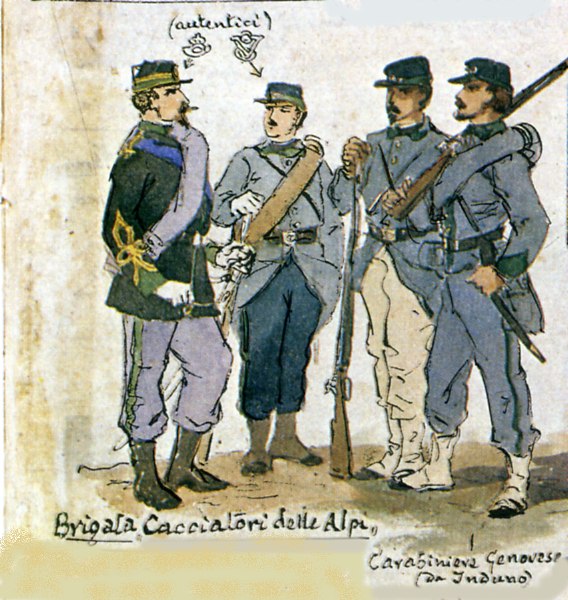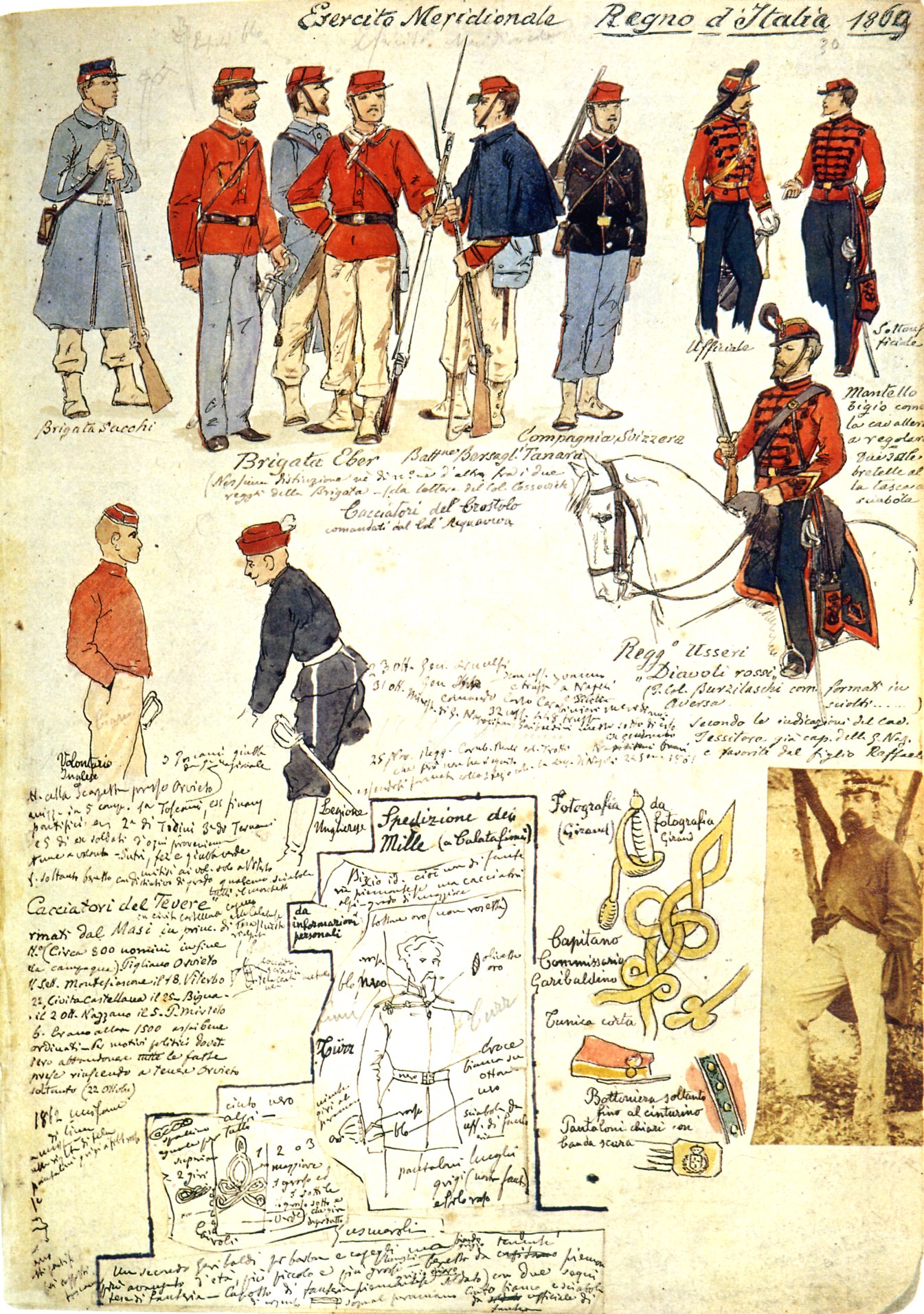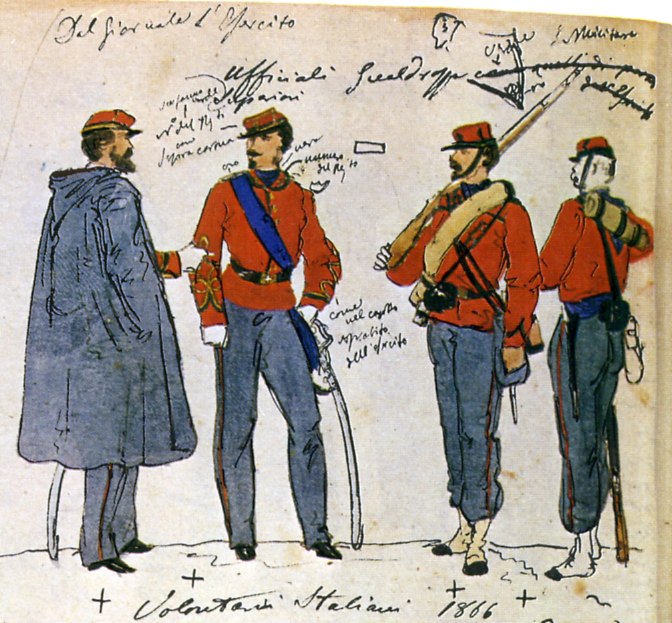 The Italian kingdom is not the fruit of the alliance between the strong monarchical principles of Piedmont and the dissolvent forces of revolution but simply that of Louis Napoleon, maybe the only monarch to help out a country not his own and to do it shedding great quantities of blood regarding his fellow countrymen. Italy has never understood this fact and in the same way never understood that it was Churchill who liberated Italy with his plan not the Americans who were against it.Ungrateful and uncaring then of the debt.
The Italian kingdom is not the fruit of the alliance between the strong monarchical principles of Piedmont and the dissolvent forces of revolution but simply that of Louis Napoleon, maybe the only monarch to help out a country not his own and to do it shedding great quantities of blood regarding his fellow countrymen. Italy has never understood this fact and in the same way never understood that it was Churchill who liberated Italy with his plan not the Americans who were against it.Ungrateful and uncaring then of the debt.
IThe attack on the south could not have come about without Louis Napoleon in this roundabout way but the other man who made Italy was Garibaldi, action not words. Piedmont threw away its only ace when they disregarded more or less the one true leader they had, Garibaldi. He alone may have driven the austrians out of Italy without Napoleon, maybe.
 original Kepi
original KepiWhenever either one side or the other, yielding to the influence of its individual sympathies or prejudices, failed to recognise that thus only, by the essential logic of events, could the unity of the country be achieved, the entire edifice was placed in danger of falling to the ground before it was completed.
 Bourbon officer
Bourbon officerWhen Garibaldi stood on Cape Faro(above), conqueror and liberator, clothed in a glory not that of Wellington or Moltke, but that of Arthur or Roland or the Cid Campeador; the subject of the gossip of the Arabs in their tents, of the wild horsemen of the Pampas, of the fishers in ice-bound seas; a solar myth, nevertheless certified to be alive in the nineteenth century—Cavour understood that if he were left much longer single occupant of the field, either he would rush to disaster, which would be fatal to Italy, or he would become so powerful that, in the event of his being plunged, willingly or unwillingly, by the more ardent apostles of revolution into opposition with the King of Sardinia, the issue of the contest would be by no means sure.

Original officers hat of the Sardinianm army used by Garibaldi

This plan was, that the Neapolitan population should overthrow Francis II., and proclaim Victor Emmanuel their King before Garibaldi crossed the Straits. But the Neapolitans would not move hand or foot till Garibaldi was among them. The fact that when Cavour was convinced that the Bourbon dynasty at Naples was about to fall, he tried to hasten its collapse by a few weeks or days, was made the most of by his enemies as an example of base duplicity. At this distance of time, it need only be said that whether his conduct of affairs was scrupulous or unscrupulous, it deceived no one, for the Neapolitan King and his friends were well convinced that the Filibuster of Caprera was their less deadly foe than the Prime Minister of Piedmont.
Garibaldi with binoculars
A series of famous drawings by Quinto Cenni
But of all the foes of Franceschiello, to use the diminutive by which, half in pity, half in contempt, the people of Naples remember him, the most irrevocably fatal was himself. Two courses were open to him when, after losing Sicily, he saw the loss of his other kingdom and of his throne staring him in the face. One was to go forth like a man at the head of his troops to meet the storm. There had been such a thing as loyalty in the Kingdom of Naples; not loyalty of the highest sort, but still the sentiment had existed. Who knows what might not have been the effect of the presence of their young Sovereign on the broken moral of the Neapolitan soldiers? 'Sire, place yourself at the head of the 40,000 who remain, and risk a last stake, or, at least, fall gloriously after an honourable battle,' was the advice given him by his minister of war, Pianell. But his stepmother or somebody (certainly not his wife) said that the sacred life of a king ought to be kept in cotton wool, like other curiosities. Meanwhile his uncle, the Count of Syracuse, proposed the other course which, though not heroic, would have been intelligible and even patriotic. This was to absolve his subjects from their obedience, and embark on the first available ship for foreign parts. Fitting the action to the word, the Count himself started for Turin. Francis awaited the doom of those who only know how to take half measures.

Aspromonte
The demoralisation, not only of the troops but of every branch of the public administration in the kingdom of Naples, was not yet a certified fact; and the enterprise which Garibaldi at Cape Faro had before him, of invading the dominions of a monarch who still had a large army, and whose subjects showed not the slightest visible sign of being disposed to strike a blow for their own freedom, looked rather fabulous than difficult. The only part of the Regno where the people were taking action was in the furthermost region of Calabria; a fortunate circumstance, since it was the first point to be attacked. Calabria, which had contributed its quota to the Thousand, contained more patriotic energy than the rest of the Regno put together.
 Its a myth to believe that the Garibaldini wore red all the time. Most of their unifoprms were what was to hand including Austrian tunics
Its a myth to believe that the Garibaldini wore red all the time. Most of their unifoprms were what was to hand including Austrian tunicsOn the 8th of August, Garibaldi sent over a small vanguard of 200 men under a Calabrian officer, with the order to join the Calabrian band of insurgents which was hiding in the woods and gorges of Aspromonte, and to spread the news that his own coming would not be long delayed. The Neapolitan generals had acquired the idea that, instead of these few men, a large force had already disembarked, and so turned their attention to the mountains; while Garibaldi, after throwing the war-ships in the Straits on an equally false scent by various intentionally abortive operations, crossed in the night of the 19th and effected a landing not far from Reggio, of which, for both moral and strategic reasons, it was of vital importance to gain possession as soon as possible.

He took with him 4500 men, and had between 14,000 and 15,000 more in readiness to follow. The royalist army in Calabria numbered about 27,000, including the garrison of Reggio, 2000 men, under the command of General Galotti. On the 20th, Bixio attacked the outposts; and on the 21st, Garibaldi fought his way into the city—not, however, without meeting a strong resistance on the part of the garrison, which might have been continued longer, and even with a different result, had not the Calabrian insurgents hurried down from Aspromonte on hearing the sound of guns, their sudden appearance making the Royalists think that they were being attacked on all sides. Next day the castle surrendered, and thus a quantity of valuable war material fell into Garibaldi's hands. His luck had not deserted him.

No comments:
Post a Comment